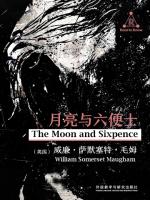Dream and Reality
Book review of the Moon and Sixpence
The Moon and Sixpence is a novel written in 1919 by William Somerset Maugham, an English novelist.
Based on the life of The French impressionist painter Paul Gauguin, the work depicts a stockbroker who suddenly goes out of his way to pursue art with madness. He gives up the stable life and his family that others yearn for. In his pursuit of art, he could disregard family, love, hunger and poverty. He is extremely focused on painting and devotes himself to achieving this dream. He travels to Tahiti in the South Pacific to pursue art and dedicates his life to the dream of art. The plot content of the story has a kind of anti-reality grotesque style, but it is in this contrast reflects the author wants to express the spirit of freedom and the criticism of the world's many constraints. Although the behavior of the protagonist cannot be understood by ordinary people, it also reveals his persistent and noble soul.
The protagonist is indifferent to material poverty and illness, nor to external opinion, nor to love or friendship. He devoted himself exclusively to painting, embedding the rest of his life in it. The work shows the contradiction between genius, personality and material civilization as well as modern marriage and family life. With a broad perspective of life, it makes a sharp dissection of human nature and mixes humor with cruel eyes. It seems to be a tragic story and a unique poem.
In 1970, sixpence was the lowest silver dollar in British currency, a symbol of lowliness and reality. The moon symbolizes ideals and pursuits. The meaning of the two is different, the strong contrast making the work more powerful. Combined with the book, the protagonist is probably the ultimate pursuit of the moon.
In his novels, Maugham deeply discusses the contradiction and interaction between life and art. This escapist theme revealed in the novel dovetails with the aspirations of many people in the West. The work is based on the life of The French impressionist painter Paul Gauguin. By using fictional plots and narrative techniques, he has created a unworldly pure artist. Compared with Gauguin's departure, the protagonist's departure is completely out of line with the logic of reality and is even more incomprehensible to the reader. Maugham ostensibly describes the fate and suffering of the protagonist, but in fact shows his own thinking on the relationship between art and life. In the novel, the protagonist also shows his extreme distrust and rebellion towards traditional artistic means, which makes him face many difficulties in painting performance. At one time, he falls into the dilemma of silence and inaction, and has to find a new way of expression suitable for himself. Maugham added his thoughts on artistic issues into his novels, which made the novels have strong conceptual nature, and this conceptual nature endowed the novels with rich and complex multiple meanings. Through the surface layer and the deep layer, the narrative and the concept of the confrontation, so that the novel has broad tension and connotation, showing the characteristics of a strong modern novel.
"His tormented life seems to have been a preparation for the mural, and when it was finished, his tortured soul, far from the world, must have been at rest." In the end, he ordered Her to burn the masterpiece. He got what he was after, created a wonderful world beyond compare, and set them on fire with pride and contempt.
The moon likes an ideal dream overhead, and sixpence signifies the reality. The protagonist so busy yearning for the moon that he never saw the sixpence at his feet. What Maugham said was, "If you look on the ground in search of a sixpence, you don't look up, and so miss the moon."
The author asks each reader how ideals and realities should be chosen. No matter what our situation, no matter our age, education, or environment, we have the freedom to choose what we most want to work for in our lives. When we have the courage to choose and are willing to take responsibility for our choices, we truly possess the freedom of life.
Thus, the outcome of a choice is usually not about who is right or wrong. The most important thing is to listen to your heart. However, if you put aside the desire for freedom and beauty that the book wants to express, it also reflects the selfish side of human nature. While pursuing the ideal, don't completely ignore the reality. In pursuing your personal dreams, don't completely ignore the feelings of those around you who love you. When you arrive the highest summit, don't forget those who accompanied you through the rough mountain road. In such a warm world, in addition to the pursuit of dreams, also remember to care for everyone who genuinely loves you.



 京公网安备 11010802032529号
京公网安备 11010802032529号